 The Protection of the Mother of God.
The Protection of the Mother of God.
In these terrible times, we must not forget to pray to the Theotokos with tears for the people of Syria, just as Orthodox Christians before us prayed in times of danger.
One example of this was celebrated last Sunday (September 1)--the Vladimir icon of the Mother of God, before whom medieval Russians prayed in the face of sure annihilation.
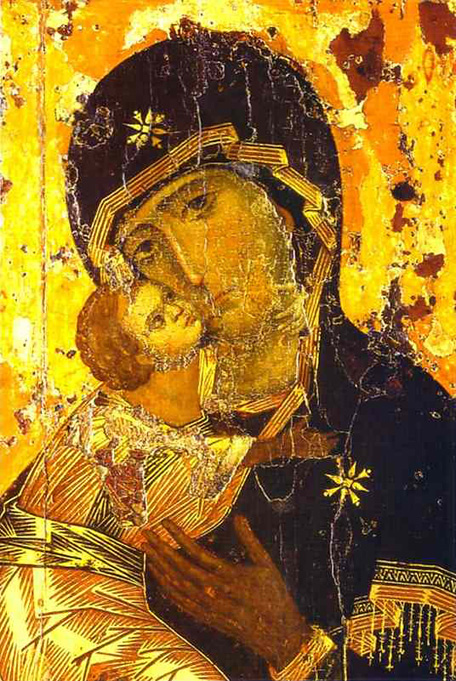 The Vladimir Icon of the Mother of God.
The Vladimir Icon of the Mother of God.
During the very hour that the people were meeting the Vladimir icon, Tamerlane lay sleeping in his tent. He saw a vision of saintly hierarchs with golden staffs descending from a high mountain, and a radiant Lady in the air above them, surrounded by angels and dazzling rays of light. Tamerlane woke up in fear. His soothsayers warned him that the Woman whom he had seen in the vision was the Protectress of the Orthodox, the Mother of the Christian God, and that her power is invincible. Tamerlane was so shaken by the vision that he swiftly departed, swooping down upon the steppe-cities of the Golden Horde, who had caused the Russians no little trouble. Tamerlane crippled them, effectively curing Russia of their threat.
Later, in 1521, the khan of Kazan, Mehmad-Girey, advanced toward Moscow with Kazan and Nogay Tartars. Metropolitan Varlaam prayed with the people before the Vladimir Icon. Grand Duke Vasiliy Ivanovich barely managed to gather enough soldiers to meet the Tartars at the kingdom’s border, near the Oka River. He was slowly retreating to Moscow, trying hard to hold ranks.
On the night of the siege, a nun in a Moscow convent had a vision, which she related to the people, warning them that they must pray hard to the Mother of God to avert disaster. All the citizens of Moscow gathered in the church for a heartfelt prayer. The Tartars again saw a vision of “a huge regiment in shining armor,” and ran away from the walls of the city.
Other icons of the Mother of God that are celebrated in Russia are the Kazan icon, before which Russian forces prayed when they took Kazan from the Moslem Tatars; the Smolensk icon, which saved the western lands from an attack by the Poles, and the Albazin icon, which protected Russia’s eastern borders from the Chinese.
Russians also celebrate an event that occurred in Constantinople, when the Byzantine capital was saved from... the Russians!
In October, 910 Constantinople, was under siege by the pre-Christian, barbarian Russians. The situation was desperate. The citizens gathered in the Blachernae church and prayed to the Holy Mother of God. After the Virgin's robe, brought to Byzantine from Palestine, was cast into the sea, a storm rose up, driving the pagan ships away.
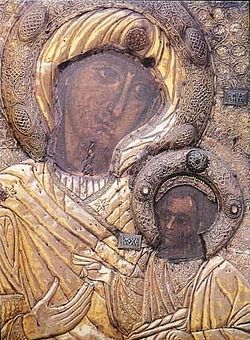 The Iveron Icon of the Mother of God.
The Iveron Icon of the Mother of God.
After a Greek uprising, when the Turks began to attack Mt. Athos, the Mother of God preserved her Holy Mountain. It has also become a tradition in monasteries all over the world to keep an icon of the Mother of God over the gates as protection.
For many centuries, Syrian Christians have been graced with the Saidnaya icon Mother of God, kept in the monastery of the Nativity of the Mother of God in the village of Saidnaya. Countless miracles have been wrought through prayer before this icon, but we recount here one that happened as recently as the year 2004. It is a story that, if it had not been broadcast on the major TV channels in the Middle East, would certainly be hard to believe, even after reading about her intercessions throughout the Christian East. Here is an account of that miracle compiled by Archimandrite Nectarios (Serfes):
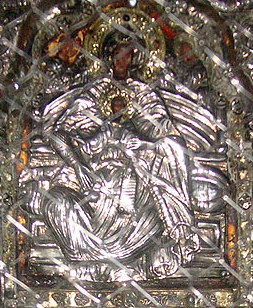 The Saidnaya icon of the Mother of God. According to tradition, this icon was painted by the Apostle Luke.
The Saidnaya icon of the Mother of God. According to tradition, this icon was painted by the Apostle Luke.
Some years ago, this man married a Moslem woman who was very rich, but sterile. As the years passed, and despite all their efforts and significant medical expenses with many doctors, they remained childless. The man's parents suggested to him that he marry a second woman, while upholding his initial marriage (as the local laws permits up to four concurrent marriages).
Being exhausted, worried, and downhearted, he did not accept his parents' advice but rather chose to vacation with his wife in Syria. There they hired a limousine with a driver who would serve as tour guide for all their site-seeing excursions throughout Syria. As the vacation progressed, the driver noticed that the Saudi Arabian couple was experiencing bitterness, pain, and grief. Having gained familiarity with the couple, the driver cautiously asked them whey they appeared to be so unhappy--was it perhaps because he was not conducting the tour to their satisfaction?
The couple confided to the driver that the source of their unhappiness was their inability to have children. The driver who was also a Moslem, then told them that in Syria the Christians, specifically the Orthodox Christians, have a monastery named Panagia Saidnaya (Arabic word meaning Our Lady) and that many people who can't have children take refuge in Her miracle-working icon. They go to the monastery, and there they are given to eat the wick form the lamp which burns before the miraculous icon. And then the "Mary" of the Christians grants them, according to their faith, what they wish.
Becoming excited, the Saudi Arabian and his wife asked the driver to take them to the "Saidnaya" monastery of "The Lady of the Christians" and said that if we have a child, then I will come back and I will give you 20,000 U.S. dollars, and I will give the monastery 80,000. So they went to the monastery and did as they were instructed. Later they returned to their homeland and after some time, his wife was found pregnant. In a few months she gave birth to a charming baby boy. It was truly a miracle of Our Lady Theotokos.
Now, as soon as his wife gave birth, the Saudi Arabian man wanted to return to Syria to uphold the promises he had made. Upon his return he called the same driver and asked to be picked up at the Damascus airport. But the driver was cunning and wicked and he persuaded two of his friends to go to the airport with him to pick up the rich Saudi Arabian man, to take his money and kill him. So they picked up the rich man at the airport and he, as they drove, without realizing that they had planned to kill him, told the friends of the driver that he would give them also 10,000 US dollars each.
These men, still not satisfied, deviated from the route to the monastery and went to a deserted place, proceeded to slay the Saudi Arabian man, and to cut off his head and other parts (hands and legs) of his body into pieces. Blinded by passion and overcome by the horrific act that they just committed, they put the man's remains in the trunk of the car rather than just leaving him there. After taking his money, watch, and all that he had, they proceeded to find another deserted place to discard the remains.
Then, on the National highway, their car broke down and stopped in the middle of that road. The three men got out to determine why the engine had stalled. Then a passerby stopped to help them but they, afraid that their terrible act would be discovered, pretended that they did not need any help. But as the passerby motorist was leaving, he noticed blood dripping from the rear of the vehicle and he called the police to investigate, because the scene and the three men looked suspicious. The police came and saw the blood under the car and on the pavement, so they ordered that the trunk be opened.
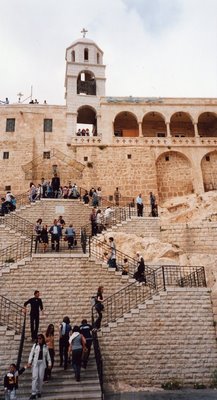 The Saidnaya Monastery, Syria.
The Saidnaya Monastery, Syria.
The Saudi Arabian went to a medical facility to undergo examination by doctors and medical examiners who confirmed and attested that the stitching was done very recently, thereby validating the miraculous event. The stitches were, and still are, obvious. When the Saudi Arabian came out of the car's trunk, he had the appearance, literally, of just having been refabricated (put back together) to which he continuously confessed that the PANAGIA had rejoined his body and resurrected him with the help of her Son.
Immediately after this, the Saudi Arabian called his relatives to come to Syria. They all went together to the monastery of Panagia Saidnaya and offered up prayers, praises, and glorification, and instead of the initially promised gift of $80,000 he gave $800,000 to the Theotokos.
Today, as this man relates the details of that overwhelming miracle, he starts his narration with, "When I was a Moslem this happened to me", thus indicating he is no longer a Moslem, nor is his family.
This miracle stunned with awesome surprise the entire Arabic/Moslem nation and all of the Middle East.
Let us Orthodox Christians never neglect to pray to the Mother of God for protection against all evil. And let us witness to those Christians who are not Orthodox, who do not revere and pray to God’s most holy and ever pure Mother, that she is indeed our Protectress in times of need.

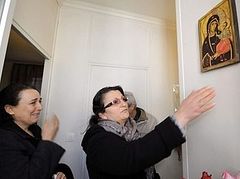
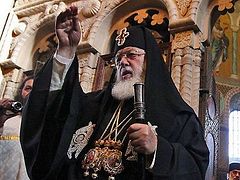
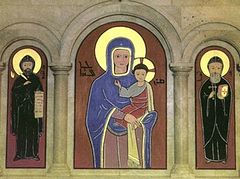
Unfortunately, no monastery of that name exists and have been unable to trace! Nor was there a Father Ignatios at the Greek Orthodox Church of Shepherd’s Field in Beit Sahour (to the East of Bethlehem) – which is built on the site of a monastery. I became even more suspicious about the truth of this incident when I discovered that such an important detail in proving (or disproving) the story, is incorrect!”
Therefore, spiritual discernment is always of foremost importance.
http://www.greeknewsonline.com/losing-my-religion-the-propaganda-of-miracles/
In Christ
PLEAD BEFORE HIM FOR OUR SALVATION FOR WE ARE ALL SINNERS.
HELP US TO FIND THE ROAD TO HIS FOOTSTEPS AND WORSHIP HIM
WITH PURE LOVE. GIVE US THE STRENGH TO WORSHIP NO OTHER.
AS THE THIEF CRUCIFIED WITH HIM BELIEVED HE WAS TRULY THE SON OF GOD AND SAID.
JESUS REMEMBER ME WHEN YOU COME INTO YOUR KINGDOM.
WE ASK FOR MERCY FOR FOR OUR SINS.
IN JESUS NAME,
AMEN.
Is this really the icon found at Saidnaya? I thought this was an icon from the holy land. The Saidnaya icon has emperor Justinian and the queen on both sides of Our Lady.
www.holylove.org
Thank God for revealing the miracle in this age where we have traveled so much away from you.
God, the shepherd, will never leave his herd alone.
Our Theotokos ,Mother of God,our mother,with the help of her son,our God,Jesus Christ,son of God ,can do every thing.
She was and still Indeed our protectress since 2000 years from this world,especially from the Jewish and Muslims extremists, who want to cancel our presence from the east.
My brothers don't be afraid ,we should pray to the Mother of God,and we receive quickly her help according to our faith.
From Lebanon.